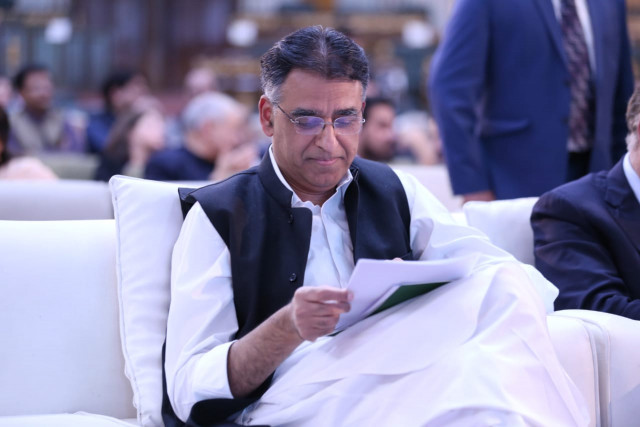Pitfalls of economic analyses
Asad Umar’s unfortunate resignation was fuelled by voodoo economic analysis spewed by the likes of Farrukh Saleem

Former finance minister Asad Umar. PHOTO: PTI
I’m a believer in free speech so I can’t challenge his right to make economic arguments at a personal level but I do want to forcefully rebut some of his economic arguments.
Consider his article, published last Sunday, titled ‘Eight Questions’ which begins with this gem of a first paragraph: “On August 20, 2018, a 16-member new cabinet took oath of office. Question 1: On August 20, 2018, the rupee-dollar parity stood at Rs122 to a dollar. The rupee has since fallen to Rs144 to a dollar. If our export-import situation is really improving, why isn’t the rupee improving?”
The sheer audacity of over-simplification here is mind blowing. Imports are sharply down year on year because the depreciation of rupee is working while exports are expected to rise with a lag. What is this fetish of having the rupee appreciate (‘improve’ in his words) versus the dollar? This will result in more swelling of the import bill which caused the trade imbalance to begin with. The government isn’t trying to ‘improve’ the rupee, it’s trying to reform the economy structurally, which will be reflected in the dollar-rupee parity over the coming years and decades (not days, weeks or months).
Take question six in the same article. “Question 6: On August 27, 2018, our finance minister told the media ‘we have moved a summary to the cabinet for introducing reforms in the FBR.’ If the FBR is being reformed then what is the explanation behind historical shortfall in tax collection? Can this shortfall be blamed on the previous government?’
The truth is that shortfall in revenue is coming behind two policy decisions that are independent of the FBR reform process. The first policy measure is to reduce taxes on oil, to make it cheaper at a time of rising oil prices, which resulted in Rs100 billion shortfall. The second policy measure is demand compression to reduce imports (and control the unaffordable $19 billion current account deficit every year). Since 40% of Pakistan’s tax revenue is raised at the import stage, reducing imports will naturally reduce tax revenue. Yes, FBR reforms need to accelerate but they’re not the primary driver behind the revenue shortfall.
Sometimes you wonder if he genuinely believes his arguments or if he’s deliberately spinning facts to peddle a narrative. Perhaps the saddest part of this story is that the PTI flirted with the idea of bringing him on as an economic spokesperson. Fortunately, this is one U-turn, which proves that a U-turn isn’t always a bad decision.
In perhaps the most dangerous tweet Farrukh has made in recent days, he argued Pakistan’s GDP growth is higher under a presidential system (read: military dictators) versus a parliamentary system, supporting his argument with a chart that simply plots GDP rates for Pakistan over a 70-year period.
When Najam Sethi tweeted back, asking him to link GDP numbers to foreign aid flows, Farrukh replied by saying, “I’m presenting facts, reasons are subjective.” What are you smoking Mr Farrukh? Because the rest of us would like some too. Reasons aren’t subjective, they’re explanatory and provide context. For example, is a person weighing 65kgs overweight or underweight? There’s no way to tell unless you have more context i.e. how old the person is, are they male or female, etc.
Farrukh, and other friends in the media, must realise that many people can lose their jobs if they continue peddling their misleading economic viewpoints and influence policy. Asad Umar will not only be the first job lost in Pakistan because of them. Many more will follow.
Published in The Express Tribune, April 21st, 2019.
Like Opinion & Editorial on Facebook, follow @ETOpEd on Twitter to receive all updates on all our daily pieces.















COMMENTS
Comments are moderated and generally will be posted if they are on-topic and not abusive.
For more information, please see our Comments FAQ